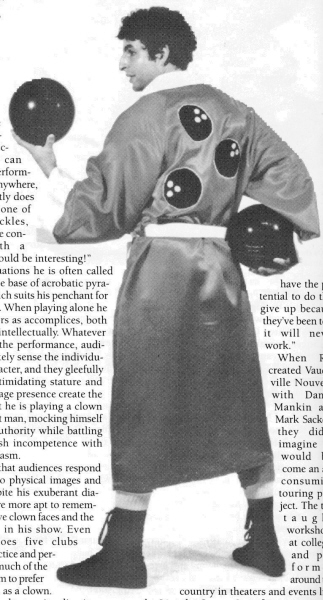
Susan Hilferdy photo |
Page 16 Summer 1992
|
From
Brooklyn to Berlin: The Trials and Triumphs of a Jewish Juggler
by
Cindy Marvell
What
do the Berlin Wall, a San Francisco vaudevillian, and "The
Merchant of Venice" have in common? Audiences found out the
answer to this and other intriguing questions as Jeff Raz took
center stage for his solo show, "Father-Land," last March
at the Berkeley-Richmond Jewish Community Center in Berkeley,
California.
Raz
has been working on the one-person play ever since 1989, when a
sight-seeing trip to Europe turned into the experience of a
lifetime. A revealing and entertaining autobiographical journey
spanning several counties and generations, the play fuses historical
events with Raz's personal quest for the truth as he uncovers his
father's past and rediscovers his Jewish roots.
While
not always a featured activity in the show, juggling provides a
structure and runs like connective tissue throughout the
performance. Juggling has played a similar role in Raz's
varied career as a performer, teacher and director, one which has
taken him down many unexpected channels.
His
early training in juggling, slapstick and acrobatics with the likes
of Bill Irwin and Larry Pisoni prepared him for his work with San
Francisco's Make-A-Circus, where he performed as a clown in the '70s
and wrote and directed circus plays in the '80s.
Jugglers
may know him as the founder of the popular trio Vaudeville Nouveau,
as the creator of numerous characters in "The Comedy of
Errors," or as the organizer of the San Francisco New
Vaudeville Festival. Westcoast audiences have seen him in a variety
of theatrical roles from Trinculo in the San Francisco Shakespeare
Festival's production of "The Tempest" to Diego Rivera in
"Frida Kahlo: A Self-Portait in Dance" at the Cowell
Theater. But to millions of adoring children, many of whom saw Raz
this season in the Pickle Family Circus, he is simply "Mr.
Clown, Sir," that big, funny man with the mustache who can lift
unbelieving volunteers into the air and balance them in
positions they never thought possible.
With
his irrepressible humor and inexhaustible
anecdotes, one can imagine
Raz performing just about anywhere, and he frequently does just
that. Said one of his fellow Pickles, "Jeff could make
conversation with a rock-and it would be interesting!"
In
group situations he is often called upon to play the base of
acrobatic pyramids, a task which suits his penchant for ensemble
work. When playing alone he enlists spectators as accomplices, both
physically and intellectually. Whatever the context of the
performance, audiences
immediately sense the individuality of his character, and they
gleefully comply. His intimidating stature and domineering stage
presence create the impression that he is playing a clown within a
straight man, mocking himself as a figure of authority while
battling his own childish incompetence with earnest enthusiasm.
Raz
believes that audiences respond most strongly to physical images and
situations. Despite his exuberant dialogue,
people are more apt to remember his expressive clown faces and the
visual comedy in his show. Even though he does five clubs smoothly
in practice and performs juggling
much of the time, people seem to
prefer thinking of him as a clown.
He said, "I used to use juggling in a more metaphorical way, but that sort of thing is extremely difficult to do successfully. Juggling is so abstract that it takes time for people to absorb it, and if it's presented in a complicated way people can easily become confused and miss the point. But I still think it's possible to do something beautiful and meaningful with juggling-most people who have the potential to do that give up because they've been told it will never work. "
In
"Aesthetic Peril," they worked to create three fully
developed characters who undertake
"a spiritual journey through the medium of vaudeville,"
enlightening the audience about the guiding principles of
"equilibrium, rhythm, and low comedy." Raz |

Susan Hilferdy photo |